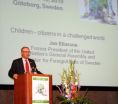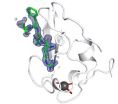(Press-News.org) Early childhood education can play a key role in relation to change when the world fails to adopt a sustainable approach economically, ecologically and socially.
This was highlighted at the World Congress "Children, citizens in a challenged world", which was hosted by the University of Gothenburg.
In a statement, the congress urges governments around the world to protect children's right to a childhood.
More and more people are realising that work with young children is a force for change in itself, towards creating a different society. Early childhood education has an important role to play here, perhaps the most important role of all," says Ingrid Pramling Samuelsson, Professor in Early Childhood Education at the University of Gothenburg and President of the organisation OMEP, Organisation Mondiale pour l'Éducation Préscolaire, which was responsible for organising the congress in Gothenburg.
Early education
During the congress, Ingrid Pramling Samuelsson gave a lecture on the link between early childhood education and sustainable development.
"Research shows the advantages of starting at an early age. Children understand what is important in relation to their own environment and based on their own experiences," explained Professor Samuelsson.
Former Chairman of the UN General Assembly and former Swedish Foreign Minister Jan Eliasson spoke at the congress and drew a somewhat dismal picture of the situation as regards respect for some of the world's most vulnerable children:
"Children already have fundamental rights, but they are not respected. These rights are not implemented, they are not incorporated into national legislation, or they are simply not known about," he said.
Pledges unfulfilled
"We have fundamental human rights, ratified in 1948, the UN Convention on the Rights of the Child from 1989, as well as the eight Millennium Development Goals adopted by all the UN states, which aim to halve the proportion of people living in poverty by the year 2015, and where many of the goals directly affect children," said Mr Eliasson.
However, actual figures reveal that change is not happening fast enough to achieve the goal by 2015, in the areas that affect children as well, such as education for all children.
"We're failing to fulfil our pledges. Children are dying of hunger and because of poor water supplies. They are being exploited sexually, as child workers and child soldiers. We're talking about human devastation on a massive scale," said Jan Eliasson.
Declaration to all governments at local and national levels:
"World declaration about the right and the joy to learn through play / OMEP 2010
During the OMEP World Assembly and Congress in Göteborg, Sweden in August 2010, all delegates representing seventy-two countries and five continents, agree that we must defend the UN Convention on the Rights of the Child, especially the right of children to play as well as ensuring their wellbeing in all countries and in educational programs.
Today, because of political and financial problems, most governments are overemphazising the swift development of literacy and numeroucy skills for our children when they start school. This results in dramatically restricting the holistic approach to early childhood education.
This situation is destroying the basis and the sense of early childhood education. This results in the loss of crucial values, creativity, imagination, open mindedness, expressive arts, thus deeply affecting the right and the joy to learn through play.
We now know, that the UN Millenium development goals on reducing poverty and giving all children the right to education will not be met. Thus, the OMEP World Congress and Assembly implore all governments at local and national levels to reorient their plans and allocate resources so that the goals will be met.
Young children are willing and capable to be agents of change. Adults should listen to children and be aware of their perspectives and ideas in matters that relate directly to them:
'We know stuff too!' (six year old child)
Ingrid Engdahl, Congress Chair"
INFORMATION:
OMEP in brief:
Organisation Mondiale pour l'Éducation Préscolaire, OMEP, is a global organisation that works for children aged 0-8 years in over 60 countries. The organisation aims to offer children the best possible conditions for a healthy childhood. OMEP acts as an advisor to UNESCO, UNICEF, the EU and the Council of Europe. OMEP was established in 1948 and the first President was Alva Myrdal. Ingrid Pramling Samuelsson was President during 2008-2010 and was re-elected at the congress for an additional three-year period.
Early childhood education important for sustainable development
2010-09-13
ELSE PRESS RELEASES FROM THIS DATE:
Female marine snails trick amorous males
2010-09-13
Sexual conflict is not only a human phenomenon. Scientists at the University of Gothenburg have shown that females of the rough periwinkle conceal their gender identity in order to avoid excessive copulation.
The females of most species of snail excrete a substance in their mucous trails that enables males to find them more easily, since they can distinguish between trails from females and those from other males. The males follow the mucous trails laid down by females in order to find a partner for mating. However, the females of one of the species studied (Littorina ...
Your body recycling itself -- captured on film
2010-09-13
VIDEO:
This video shows UBR-box recognition of an arginine residue at the beginning of a protein (blue) targeted for degradation. The structural integrity of the UBR box depends on zinc (grey)...
Click here for more information.
Our bodies recycle proteins, the fundamental building blocks that enable cell growth and development. Proteins are made up of a chain of amino acids, and scientists have known since the 1980s that first one in the chain determines the lifetime ...
How football playing robots have the future of artificial intelligence at their feet
2010-09-13
The new Premier League season has begun and in Madrid the World Cup celebrations are barely over, yet according to research in WIREs Cognitive Science the world's best players may soon be facing a new challenge from football playing robots, which their creators claim will be able to play and beat a human team. The research reveals how building robots to play football is driving the development of artificial intelligence and robotic technology which can be used for roles including search and rescue and home help.
The author, Claude Sammut, from the ARC Centre of Excellence ...
Breakthrough in drug trial offers hope for heart attack patients
2010-09-13
New findings from a major drug trial have brought experts a step closer to developing a drug which could prevent thousands of British deaths from heart attacks.
Dr Robert Storey, Reader at the University of Sheffield and Consultant Cardiologist at Sheffield Teaching Hospitals, was the UK lead for international trials of a new drug, ticagrelor, which have been taking place over the last six years.
The new findings from one of these studies, the ONSET/OFFSET study, revealed that the platelet function in patients taking ticagrelor recovered much quicker after the drug ...
Brain stimulation can help partially paralyzed stroke patients regain use of their muscles
2010-09-13
Stroke patients who were left partially paralysed found that their condition improved after they received a simple and non-invasive method of brain stimulation, according to research in the September issue of the European Journal of Neurology.
Researchers from the Ain Shams University in Cairo, Egypt, studied 60 patients with ischaemic stroke - where the blood supply is reduced to the brain - who had been left with mild to moderate muscle weakness down one side of their body.
Twenty of the randomly assigned treatment group received repetitive transcranial magnetic ...
MIT researchers develop a way to funnel solar energy
2010-09-13
CAMBRIDGE, Mass. - Using carbon nanotubes (hollow tubes of carbon atoms), MIT chemical engineers have found a way to concentrate solar energy 100 times more than a regular photovoltaic cell. Such nanotubes could form antennas that capture and focus light energy, potentially allowing much smaller and more powerful solar arrays.
"Instead of having your whole roof be a photovoltaic cell, you could have little spots that were tiny photovoltaic cells, with antennas that would drive photons into them," says Michael Strano, the Charles and Hilda Roddey Associate Professor of ...
Engineers make artificial skin out of nanowires
2010-09-13
Berkeley – Engineers at the University of California, Berkeley, have developed a pressure-sensitive electronic material from semiconductor nanowires that could one day give new meaning to the term "thin-skinned."
"The idea is to have a material that functions like the human skin, which means incorporating the ability to feel and touch objects," said Ali Javey, associate professor of electrical engineering and computer sciences and head of the UC Berkeley research team developing the artificial skin.
The artificial skin, dubbed "e-skin" by the UC Berkeley researchers, ...
Cancer deaths fall, but prevention still lags behind
2010-09-13
Although overall mortality from cancer is decreasing in the European Union, its incidence increased by almost 20%, from 2.1 million new cases in 2002 to 2.5 million in 2008, says a special issue [1] of the European Journal of Cancer (the official journal of ECCO – the European CanCer Organisation) on cancer prevention, published today (Monday 13 September).
The current economic crisis threatens to affect cancer incidence in a number of areas, says a paper by Dr. José M. Martin-Moreno from the University of Valencia, Spain, and colleagues. Public donations to cancer ...
Scripps Research scientists solve long-standing mystery of protein 'quality control' mechanism
2010-09-13
LA JOLLA, CA – September 9, 2010 – Scientists from The Scripps Research Institute have solved a long-standing mystery of how cells conduct "quality control" to eliminate the toxic effects of a certain kind of error in protein production. The findings may lead to a better understanding of a host of neurodegenerative diseases.
The research was published in an advance, online issue of the journal Nature on September 12, 2010.
"It is exciting because we are dealing not only with a process that is clearly relevant for physiology and disease," said Scripps Research Assistant ...
Gene discovery could yield treatments for nearsightedness
2010-09-13
DURHAM, N.C. -- Myopia (nearsightedness) is the most common eye disorder in the world and becoming more common, yet little is known about its genetic underpinnings.
Scientists at Duke University Medical Center, in conjunction with several other groups, have uncovered a gene associated with myopia in Caucasian people from several different regions, including Dutch, British and Australian subjects.
Their work was published in Nature Genetics online on Sunday, Sept. 12.
Myopia happens when the focal point of an image falls just short of the retina at the rear of the ...




